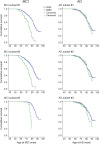Sleep-disordered breathing advances cognitive decline in the elderly
- PMID: 25878183
- PMCID: PMC4433459
- DOI: 10.1212/WNL.0000000000001566
Sleep-disordered breathing advances cognitive decline in the elderly
Abstract
Objective: To examine whether the presence of sleep-disordered breathing (SDB) is associated with an earlier age at mild cognitive impairment (MCI) or Alzheimer disease (AD)-dementia onset in participants from the Alzheimer's Disease Neuroimaging Initiative (ADNI) cohort. We also examined whether continuous positive airway pressure (CPAP) use is associated with delayed onset of cognitive decline.
Methods: From the ADNI cohort, 3 subsets with progressively stringent criteria were created in a step-wise manner. Age at MCI or AD-dementia onset was the main outcome variable. Analyses were performed separately for each subset in untreated SDB+ vs SDB- and untreated SDB+ vs CPAP+ groups. Chi-square and t tests were performed to examine between-group differences. Survival analyses were performed using the Kaplan-Meier method, compared by the log-rank test, and assessed by multivariate Cox regression adjusting for potential confounders.
Results: SDB+ patients had a younger age at MCI onset in all subsets (MC1: 72.63 vs 83.67; MC2: 72.15 vs 83.45; MC3: 77.40 vs 89.89; p < 0.01). SDB+ patients had a younger age at AD-dementia onset only in our most conservative subset (AC3: 83.46 vs 88.13; p < 0.05). In a combined outcome analysis, SDB+ patients had a younger age at onset to MCI or AD-dementia in all subsets. In subsets 1 and 2, CPAP use delayed the age at MCI onset (CMC1: 72.63 vs 82.10; CMC2: 72.11 vs 82.10; p < 0.01).
Conclusions: Consistent with our hypothesis, the presence of SDB was associated with an earlier age at cognitive decline. Our findings in CPAP+ participants suggest that CPAP treatment of SDB may delay progression of cognitive impairment.
© 2015 American Academy of Neurology.
Figures


References
-
- Lee SD, Kang SH, Ju G, et al. The prevalence of and risk factors for sleep-disordered breathing in an elderly Korean population. Respiration 2014;87:372–378. - PubMed
-
- Foley D, Monjan A, Masaki K, et al. Daytime sleepiness is associated with 3-year incident dementia and cognitive decline in older Japanese-American men. J Am Geriatr Soc 2001;49:1628–1632. - PubMed
